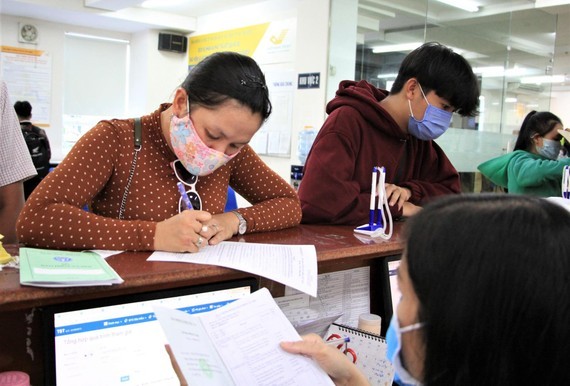 People register to buy social insurance
People register to buy social insurance
According to the report on the results of thematic monitoring on the implementation of social insurance policies and laws in the 2016-2021 period conducted by the National Assembly's Committee of Social Affairs, the number of participants in social insurance reached nearly 16,547,000 people including 15,097,007 compulsory social insurance buyers, accounting for about 33.8 percent of the labor force in the age group.
Besides, the number of people participating in unemployment insurance is 13,394,943 people; thus, the workforce of working age participating in unemployment insurance only reached 29.76 percent.
The Committee of Social Affairs’ results have shown that the social insurance revenue in 2021 reached more than VND 269,100 billion. In comparison to 2016, the figure revealed an increase in social insurance buyers of 26.74 percent and an increase in revenue of 53.26 percent.
Furthermore, the average monthly salary as a basis for payment of compulsory social insurance in 2021 is VND 5,698,469, an increase of 32 percent compared to 2016; however, the annual increase is only about 6 percent ( except in 2021 when there was no salary increase). The Committee of Social Affairs emphasized that the increase thus only corresponds to the regional minimum wage increase.
Notably, the average monthly salary as the basis for paying voluntary social insurance contributions in 2021 is VND 1,282,521, down nearly 40 percent compared to 2016.
The group of participants in compulsory social insurance was seen an increase of 17.47 percent and the rate of the revenue increase was 51 percent, nearly 3 times higher than the rate of increase of buyers compared to 2016.
However, although there is a tendency to increase in the group participating in voluntary social insurance both in terms of the number of buyers and revenue compared to 2016, the rate of participants and revenue growth is contradicted.
The increase rate of participants reaches 611.15 percent but the revenue growth rate is only 412.2 percent.
Worse, the monthly salary as the basis for paying voluntary social insurance contributions in 2021 is lower than the poverty line and tends to decrease.
The Committee of Social Affairs reported that participants in voluntary social insurance after being eligible for retirement benefits are likely to continue to need support from the government because their pension will be lower than the average living standard of the locality.
The Committee also noted that according to a report by Vietnam Social Insurance, the amount of late payment of social insurance contributions in 2021 is up to VND7,700 billion, an increase of more than VND2,500 billion compared to 2016 and has increased rapidly since the Covid-19 epidemic. According to the Committee’s statistics, more than VND9,200 billion was the amount of late payment of social insurance contributions in 2020, an increase of VND1,800 billion while it was VND7,400 billion in 2019.
Early withdrawal of insurance once is also a concern. In 2016, the number of people entitled to one-time social insurance benefits was just over 500,000 people; however, this number has increased to 863,446 people in 2021. Moreover, 98.8 percent of those who are entitled to one-time social insurance benefits according to regulations did not pay social insurance for one year.
Especially in 2020 and 2021, due to the impact of the Covid-19 pandemic, the number of people receiving one-time social insurance benefits was much higher than the number of new social insurance buyers. In addition, the number of people re-entering social insurance according to preliminary statistics is only about 140,000 people, accounting for 3.5 percent of the total number of people who have enjoyed the one-time social insurance regime. More importantly, there is currently no effective solution for the matter.
























